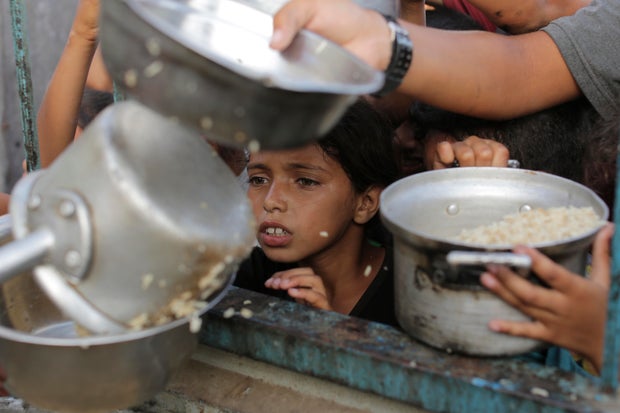The Israeli military announced on Sunday a “tactical pause” during the day in parts of the south of Gaza to clear a backlog in humanitarian aid deliveries destined for desperate Palestinians facing a humanitarian crisis triggered by the war with Hamas.
The daily break announced by the military applies to around 12 kilometers of road in the Rafah area. However, fighting in the city of Rafah, where Israel is targeting remaining brigades of Hamas militants, will continue, the military said.
The army said the pause would begin at 8am local time (0500 GMT) and remain in effect until 7pm local time (1600 GMT). He said the breaks would occur every day until further notice.
Abdel Kareem Hana/AP
The pause is intended to allow aid trucks to reach the nearby Israeli-controlled Kerem Shalom crossing, the main entry point for incoming aid, and travel safely to the Salah a-Din highway, a main north-south road, said the military. The crossing has been bottlenecked since Israeli ground troops moved into Rafah in early May.
The pause falls short of a complete ceasefire in the besieged territory that has been sought by the international community, including Israel’s main ally, the United States.
If sustained, the limited cessation of fighting could help address some of the Palestinians’ overwhelming needs, which have increased further in recent weeks as the war, now in its ninth month, continues.
COGAT, the Israeli military body that oversees aid distribution in Gaza, said the route would increase the flow of aid to other parts of Gaza, including Khan Younis, Muwasi and central Gaza. Hard-hit northern Gaza, which was one of the first targets of the war, is being served by goods entering through a northern crossing.
The military said the pause on Sunday, which begins as Muslims in Gaza and elsewhere begin marking the main Eid Al-Adha holiday, came after discussions with the United Nations and international aid agencies.
Following criticism over the action of ultranationalists in Prime Minister Benjamin Netanyahu’s government, who oppose the suspension of the war, the military said that the fighting is not being stopped in the rest of southern Gaza and there is no change regarding entry of help in general.
Jehad Alshrafi/AP
The pause along the southern route comes at a time when Israel and Hamas are evaluating the latest ceasefire proposal, a plan that was detailed by President Biden in the administration’s most concerted diplomatic effort to halt the fighting and release hostages taken by the militant group. Although Biden described the proposal as Israeli, Israel has not fully embraced it and Hamas has demanded changes that appear unacceptable to Israel.
Fighting continues unabated and Israel on Sunday announced the names of a total of 11 soldiers killed in recent attacks in Gaza, including one who died from wounds suffered in an attack last week. That brings the number of soldiers killed since Israel began its ground invasion of Gaza last year to 308. Hamas killed 1,200 people during the Oct. 7 attack that started the war and took 250 hostages, Israeli officials say. Health officials in Hamas-controlled Gaza say more than 37,000 Palestinians have been killed in the war.
Israel’s eight-month military offensive against Hamas, triggered by the militant group’s October 7 attack, has plunged Gaza into a humanitarian crisis, with the UN reporting widespread famine and hundreds of thousands of people on the brink of starvation.
The flow of aid into southern Gaza has slowed as humanitarian needs have grown. More than a million Palestinians, many of whom had already been displaced, fled Rafah after the invasion, flocking to other parts of southern and central Gaza. Most now languish in ruined camps, using trenches as latrines, with open sewage in the streets.
COGAT states that there are no restrictions on the entry of trucks. It says that more than 8,600 trucks of all types, both humanitarian and commercial, entered Gaza from all crossings between May 2 and June 13, an average of 201 per day. But much of this aid accumulated at intersections and did not reach its final destination.
A COGAT spokesman, Shimon Freedman, said it was the UN’s fault that its cargoes accumulated on the Gaza side of Kerem Shalom. He said the agencies have “fundamental logistical problems that they haven’t resolved,” especially a lack of trucks.
The UN denies such allegations. It states that fighting between Israel and Hamas often makes it too dangerous for UN trucks inside Gaza to travel to Kerem Shalom, which is right next to Israel’s border.
It also states that the pace of deliveries has been slowed because the Israeli military must authorize drivers to travel to the location, a system that Israel claims was designed for drivers’ safety. Due to the lack of security, humanitarian aid trucks in some cases were also looted by mobs as they moved along Gaza’s roads.
The new agreement aims to reduce the need to coordinate deliveries by providing an uninterrupted window of 11 hours per day for trucks to enter and exit the crossing.
It was not immediately clear whether the army would provide security to protect the aid trucks as they moved along the highway.
Meanwhile, a temporary offshore pier, designed to transport desperately needed humanitarian aid, is being built. being temporarily dismantled – for the second time – because of the rough seas.
US Central Command announced Friday that the pier built in the USA it was being removed from the Gaza coast and towed back to Ashdod, Israel, to prevent it from being damaged. The pier will be “quickly re-anchored” once water conditions are calm, CENTCOM said, but did not provide an estimate of when that would happen.
bol co
jogo de terror online
novela sbt ao vivo
wishlist
musica terra seca
taça png
























